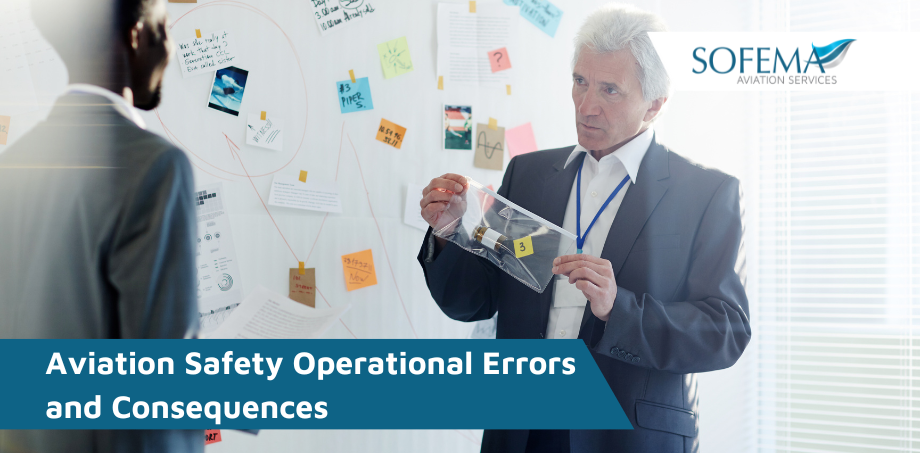Sofema Aviation Services (SAS) www.sassofia.com considers the Aviation Safety Operational Errors and Consequences.
Introduction
It is understood that human error is often identified as a contributing factor when considering the events leading to incidents and accidents.
- Note – Human Factors should not be identified as a Root Cause (Why?)
Safety officers typically identify both human errors and violations when analyzing the data from both Safety reports and Aircraft Flight Data.
Defining Human Error and Violation
Violations are intentional behaviours that break known rules, procedures, or norms. Whilst Errors are not intentional however the original “intended” action is of course intentional.
Errors can be divided into the following categories:
- Slips (Actions that do not go as planned)
– Slips are usually easy to detect quickly and do not have immediate serious consequences due to built-in system protections.
- Lapses (Memory Failures)
– Lapses may be more difficult to detect and therefore may also be more likely to have consequences.
- Mistakes are failures in the plan of action
o Even if the execution was correct, it is not possible to achieve the intended outcome.
o Plans that lead to mistakes can be:
– Defective (not good for anything),
– Inappropriate (good for another situation),
– Clumsy (with side effects) or
– Dangerous (with increased risks).
Note – Mistakes are often more dangerous, because the person committing the mistake believes that they are correct and carry on with the action.
Skill-Based Behaviour takes place without a great deal of our conscious control.
Rule-Based Behaviour are actions are not inherent in the content of the “driver” but are based on experience or instructions which are learned through previous experiences.
Knowledge-Based Behaviour This kind of behavior occurs when the human must explicitly formulate goals and actively engage in problem-solving, allowing the human to model the situation correctly.
Consequences of Errors and Violations
- Errors and violations together form the unreliable part of human performance. It is often stated that 70-90 percent of current aviation disasters are due to “human factors.”
- Errors and violations contribute to accidents both directly and by making the consequences of other problems more serious.
Summary
Successful management of errors and violations requires continuous application of systemic improvements at the organizational level. Ultimately, violation-free operations should become the aspiration of the corporate culture.
Even the best safety program cannot prevent all errors. Therefore, the best strategy to adopt is error management. It is important to identify the root causes related to any events whether caused by Errors or Violations It is also important to recognize that it is not always productive to punish a violator if the violation has been committed due to organizational or cultural factors.
Next Steps
Follow this link to our Library to find & Download related documents for Free.
Sofema Aviation Services Provides Safety Management System Consultancy, Classroom, Webinar and Online Training including the following course. For additional details please see our websites www.sassofia.com and www.sofemaonline.com or email team@sassofia.com
Tags:
aviation, aviation safety, Human Factors, Safety, Safety Management System SMS, Safety Management, Aviation Industry, SMS, Aviation Safety Management System, Aviation SMS, Aviation regulatory training, SAS blogs, Violations, Operational Errors, Consequences




